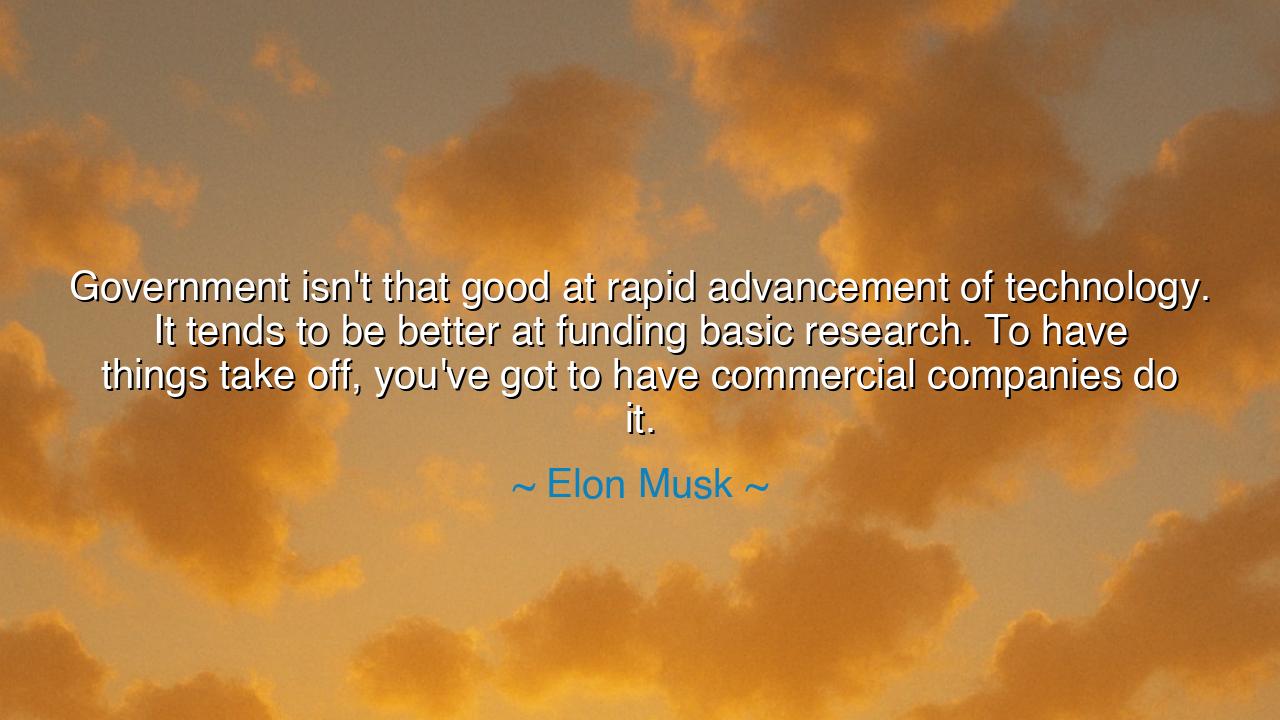
Government isn't that good at rapid advancement of technology. It
Government isn't that good at rapid advancement of technology. It tends to be better at funding basic research. To have things take off, you've got to have commercial companies do it.






In the chronicles of the modern age, when man’s hand reaches for the stars and his mind builds engines that think, the seeker of progress — Elon Musk — spoke thus:
"Government isn't that good at rapid advancement of technology. It tends to be better at funding basic research. To have things take off, you've got to have commercial companies do it."
These words are not merely the utterance of a man of industry, but the echo of a timeless truth: that innovation is born in the temple of freedom, not the fortress of bureaucracy. It is the difference between a river that flows and a pond that stagnates. Musk, like a smith forging light from flame, calls us to understand that governments may sow the seeds of knowledge, but it is commerce — the will of daring souls — that makes those seeds bloom into the forests of progress.
In ancient days, mighty kingdoms built monuments, but it was the restless merchants who built empires of thought. So too, in our time, it is not the councils and committees that dare the impossible, but those who risk their fortunes and their pride for visions unseen. The government, steady and deliberate, builds foundations of learning — funding the scholars, the laboratories, the quiet minds who explore the unknown. Yet when the moment comes to leap, to transform research into reality, it is the entrepreneur, the innovator, the builder of enterprises, who carries the torch forward into the storm.
Musk’s words arise from the furnace of experience — for he himself walked the line between vision and impossibility. When NASA’s wings grew heavy under the weight of its own machinery, when rockets fell silent and budgets cut their flame, it was SpaceX, a child of private daring, that reignited the dream of reaching the heavens. The government had once blazed the trail, but it was commerce that rekindled the fire. Thus was the balance revealed: research by the state, revolution by the brave.
Consider also the age of the Wright brothers, humble bicycle makers who, without the blessing of any government, defied the heavens and gave mankind the gift of flight. Around them were great universities and well-funded projects, yet none dared to leap into the unknown sky. It was not bureaucracy that gave wings to man — it was individual courage, driven by wonder, not permission. And when their frail machine first rose above the dunes of Kitty Hawk, it carried with it the eternal proof that the spirit of progress lives in the daring, not the appointed.
So too it was when Thomas Edison lit the world with his lamp, while governments still debated the feasibility of electric light. So too when Steve Jobs and his companions, in the humble garages of California, dreamed of devices that would make the whole world one voice. The story repeats through the ages: institutions preserve, but individuals create. The government guards the past; the visionary builds the future.
But take heed, for Musk’s words are not scorn — they are balance. For even the boldest flame needs the hearth from which to rise. The government, with its vast reach and enduring patience, nurtures the roots of basic research — physics, biology, mathematics — the foundations upon which the innovators stand. Without that soil, the daring would find no ground. Yet the government, by its very nature, fears the storm; it values safety above speed, procedure above passion. Thus, when the dawn of innovation comes, it is the commercial spirit — unbound, untamed — that turns vision into reality.
Learn then, O seeker of progress, from this sacred symmetry: the state and the innovator are two halves of one whole — but it is the heart of the individual that gives life to the dream. Do not wait for permission to build; do not linger for decrees to act. The greatest revolutions of mankind were born not from orders, but from conviction. The builder, the thinker, the dreamer — these are the true engines of civilization.
So let this teaching be written upon the walls of your mind: governments may fund discovery, but it is the spirit of enterprise that ignites destiny. Be not the keeper of what is known — be the maker of what is yet to be. If the road is closed, carve your own path. If the sky is forbidden, build your own wings. For in every age, progress belongs not to the cautious, but to the courageous — to those who dare to move faster than the world allows.
Thus ends the teaching: respect the foundation, but rise beyond it.






AAdministratorAdministrator
Welcome, honored guests. Please leave a comment, we will respond soon